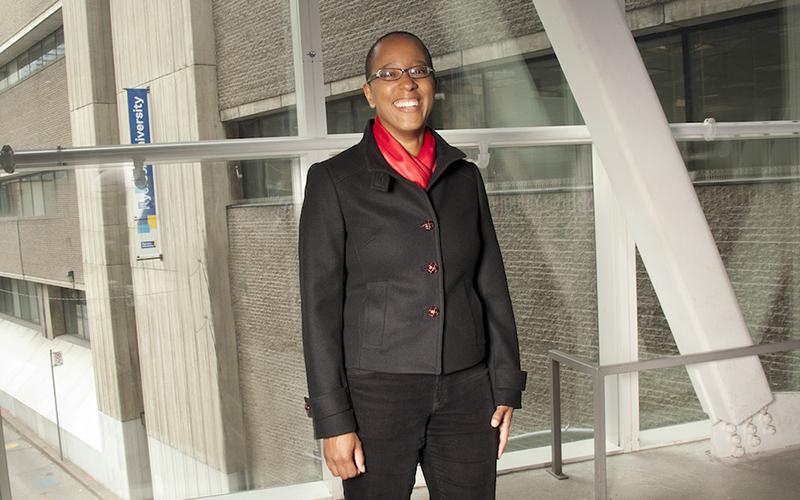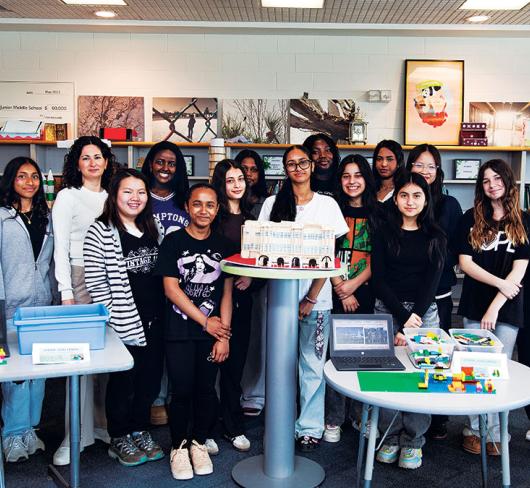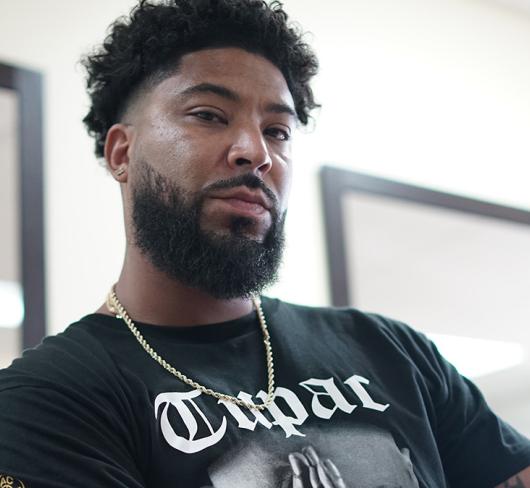
Community Organizing to Make Change: Izida Zorde in Conversation with Ryerson University’s Sam Gindin Chair in Social Justice and Democracy Kiké Roach
Izida Zorde: You have been a community organizer and civil rights lawyer and were recently appointed Sam Gindin Chair in Social Justice and Democracy. What does organizing mean to you and why is it particularly important in this moment?
Kiké Roach: Organizing means so many things to me. The freedoms and benefits I enjoy, the way I live my life today, have been a product of people struggling, people organizing, coming together, speaking out for social justice. I’m a Black woman who is a lesbian, who practices law in Canada, and while I take them for granted now, if we think about all the things that had to happen for me to be able to live my life the way I do, it all goes back to people coming together to fight discrimination, to make a better life. So, organizing for me means creating a better life. It means creating the kind of community I want to live in. It means coming together with different people so we can make the kinds of things we want to see and enjoy in our lives a reality. We’ve had to struggle and fight against a lot of different forces – sexism, homophobia, racism, all the “isms”, basically – that have created a dynamic in society where some people benefit and others struggle. A lot has changed but I think it’s important for us to keep going because we still haven’t gotten to where we need to be. I enjoy a lot of privilege, but looking around me I can see that we live in a world where a lot of people don’t have the same benefits I enjoy every day. I think it was Alice Walker who said, “Activism is the price I pay to live in this world.” I think what she meant was that as long as there are people in distress, people who are facing discrimination or facing difficult situations, we have to do something. We have to come together and try to change those dynamics.
IZ: We’ve talked before about how the election of Donald Trump and the rise in popularity of extreme right wing points of view have caused a lot of despair. How does getting involved in your community provide an antidote to the anxiety and fear people are feeling?
KR: Somebody spray painted a slogan on a wall that said, “no matter who you elect the government always gets in.” We have to be more active, we have to make our presence felt. We cannot rely on a restricted definition of democracy. We are often sold a bill of goods that says democracy is voting on a certain day, but that’s just a very tiny part of it. I think with the forces we’re seeing now in the United States and here, we’re reminded that democracy is something that happens in between elections, when people make their voices heard, when people make their presence felt, when people organize and come together and say no to what we don’t want, but also when we fashion the solutions we do want to see happen. We’re increasingly moving into a time when we are going to have to say no strongly and clearly, whether it’s no to pipelines or to the mismanagement of public monies. I think about the many people I know who are struggling just to find decent affordable childcare and I think about reports in the media about sexual assault and violence against women. I don’t see politicians talking about those issues on a day-to-day basis. I don’t see our representatives talking about, or being in touch with, how much work we still need to do on these issues.
Sometimes a problem seems really far from us, or so huge we can’t get our arms around it. But when we become aware of an issue and when we start to ask ourselves, “What power do we actually have?” when we start coming together with a common purpose to make change, it is possible. There is something exciting to me when I’m gathered with thousands of people and we’re all there for the same purpose. Those are the moments when I’ve felt most that change is just around the corner.
IZ: You’ve talked about your involvement in the women’s movement. How has feminism and the women’s movement informed your organizing? How do we ensure that our movements are inclusive and intersectional?
KR: I have been fortunate to work with women who had a certain humility toward the work. This is not to say there were never personality clashes or differences of opinion. There were, but in feminist groups I saw people working tough decisions out together, trying to achieve consensus. I saw women who reflected on their positions and had the courage to admit when they were wrong and change course. For a while after I became a civil rights lawyer, I thought I wasn’t doing feminist work because I went into a male dominated field and spent a lot of time examining policing and incarceration issues. But I came to see that what I was doing was trying to chip away at the very patriarchal systems, with built-in hierarchies, that resort to violence and punishment to solve problems. I wanted to be part of showing there is another way. Feminist thinking has helped me see things through a more holistic lens and to ask deeper questions that get at why things are set up the way they are, to ask questions about root causes and systems, to go beyond individual circumstance. The feminist phrase, “the personal is political,” means a lot to me. Ensuring our movements are inclusive takes being vigilant, making a constant effort to have as wide a cross-section of different backgrounds and life experiences around the table as possible when decisions are being made and striving to keep the voices of those who are most affected by the issue at the centre of our collective deliberations.
IZ: Can you talk about your work as a civil rights lawyer and how you fought together with communities to ensure that their rights and freedoms were protected?
KR: Becoming a lawyer changed my activism. I still protested in the streets every so often but I moved from organizing in community to representing collective interests and causes in court. I worked on cases to win compensation for people who were wronged by the state and I tried to bring about systemic changes to policing through inquests. I represented family members whose loved ones were killed by the police. I represented people who were in detention and being denied adequate healthcare. I represented people with psychiatric disabilities who were poor and/or racialized, discriminated against and having difficulty getting their basic rights respected. Working in this way gave me a real sense of purpose but, over time, I came to see how deeply entrenched inequality is and to understand there are no quick fixes. We have to work on a whole range of different fronts to dismantle systems that don’t work for everyday people.
IZ: What were some of the challenges of organizing? What are some important lessons you have learned over the years?
KR: There are many challenges to organizing. We all come from different backgrounds with different perspectives, different life experiences; that can pose a challenge. We don’t always approach a situation or a problem from the same vantage point and we don’t always have the same idea in mind about how the change should happen. So, for example, in the women’s movement, I’ve been in situations where women from different racial backgrounds were working together and there were times when we had difficult conversations and when there was tension in the room. I think those are the moments we’re not prepared for. As a society, there’s nowhere we can talk about the things that historically have divided us. We don’t always have the language or tools for talking about racial or other differences we might experience in our lives. We’re living with a disability, or in a same-sex relationship, or we’re transgendered, or we’re coming from all these diversities. We don’t all have the same educational background and we don’t grow up with the same economic security. I’ve experienced situations where people took something that was said personally and it created a disruption and took a long time to work through. Sometimes it didn’t work out. Sometimes people were just at loggerheads. But what was important was that we recognized those moments and tried to sit down and analyze them and say, “What went wrong there? What could we have done differently?” We’re making a lot of this up as we go along. We’re trying to figure out how to work well together as a group of people who come from different backgrounds and different experiences.
IZ: What are some of the tactics you’ve used to get over those kinds of divisions? What do you do when those moments happen but you still have to keep organizing together?
KR: One of the things that we came to understand was that we needed to set a framework for the discussion and make it explicit that we’re not all coming from the same experience. We have this diversity of opinion and life experience and we need to keep that at the forefront of our minds. We also need to practice listening to each other better. We have to acknowledge that, while we can be well-intentioned and think of ourselves as progressive people, we’ve nevertheless all been raised in a society that has actively or subconsciously practised systemic discrimination against different people. Sometimes it means dividing up and having people meet in subgroups to talk about those things. I’ve also been in a situation as a spokesperson that posed a challenge to me. I had a woman with disabilities come and say to me, “That was a great speech but you didn’t say anything about women with disabilities.” I had to stop and reflect and not be defensive, but listen. One of the challenges when you’re a spokesperson is to keep in mind that a single issue might affect different people differently. It challenges us to examine our notion of what leadership means. Maybe one person can’t speak for everybody; we need people who have had different experiences to come forward and have a voice. If we want to create a society of equality, we’ve got to start with ourselves, our own groups. What do they look like? Have we taken into account all of the members of the community?
What are we talking about with organizing, then? We’re talking about sharing power. That’s at the root of people being able to live freely, being able to live joyously, being able to do what they want in life. What does this mean within our own organizations? We have to start with ourselves because we can’t manifest something that we are not practicing. Who are the people we have around the table when we’re talking about a problem? Is it the people who are most affected by the issue? Is it people with a diversity of views? Diversity comes in many different forms. It’s not just men and women and people with disabilities and trans-gendered people and same-sex and heterosexual and immigrant and people who have lived here a long time, it’s also people who think differently. A lot of that is informed by the way we live our lives but it’s also by having a committee, having a meeting, where people are encouraged to raise their voices and where we’re encouraging honest, frank discussions about the realities that we’re facing. We can’t sit in a room and come up with a bunch of talking points that sound good and think we’ve analyzed the problem. Did we go out and talk to people living this day to day? It’s not going to work if we haven’t. We’re not going to be able to ask the community for support if the decision makers are hiding behind closed doors. People will say “I don’t feel that this represents me.” If we don’t energize people and get people involved and engaged because we’re talking about things that go on in their lives every day, our movements will stagnate.
Another challenge of organizing is staying optimistic and hopeful we will succeed. When I was a kid, one of the first times I went to a funeral parlour was to see a man named Albert Johnson. He was shot and killed in his own home in front of his family by the police. He was unarmed. That galvanized the Black community in Toronto and it had a lasting impact on my life. I thought, “This is so wrong; this is so unjust. How could this happen? How could this happen in this man’s home, in front of his wife, in front of his daughter?” I remember feeling very vulnerable as I walked with my parents. But when I saw people coming together, all kinds of people that I’d never seen before, walking in the streets saying that it was wrong, protesting loudly and demanding change, something changed for me. That’s a moment when I realized that we do have power. I decided I was going to try to use my voice to speak up for people who have had their rights taken away.
IZ: If someone didn’t know where to start and asked you to outline five steps to organizing in your community, what would you tell them?
KR: Organizing starts with the individual. I remember reading a quote from Harriet Tubman: “I freed 1,000 slaves; I could have freed 1,000 more if only they had known they were slaves.” And I think what she meant was you’ve got to start from the place of realizing what’s wrong and deciding you’re not going to accept it. Step number one is: what is the issue you want to change? What is it you want to organize around? From there you go to examining the problem: how did it get created, who is affected, who’s involved in continuing to make this situation exist as it is? And that leads you to talk with a lot of people. The third step is creating positive dialogue that leads to the fourth step that asks: what are the solutions? A lot of the time we go out into the streets or to control our own bodies, the right to decide for ourselves when we want to become pregnant, the right to birth control, the right to healthy and safe abortion, the right to same sex marriage and broad acceptance that being a lesbian or gay person or a trans-gendered person is not abnormal or a mental illness. All these changes came about because people were organizing. And there are more: the ability of people of colour to enter politics and hold office or take jobs where we were previously banned, to go wherever we want. There have been so many changes if we think about the work that unions have done – pay equity, maternity leave, the right to have breaks at work. We’ve seen increased diversity in our public services, so different than when I was a kid. There’s been a major sea change in terms of the issue of violence against women. At one point, women were left on their own in the face of abusive relationships. Women mobilized and organized and created rape crisis centres, shelters. We changed the way society thinks about violence against women and we changed the culture so that violence is not acceptable, even though it still happens.
There are a lot of issues we still need to grapple with. As we reflect on Canada turning 150, we need to address residential schools and the history of colonialism in this country and what it has done to Indigenous people. We are seeing people living in dire situations, under boil water advisories, and we’re seeing suicides of young, Indigenous people. We need to raise awareness, raise the consciousness of people and shed light on the issue so that we can take steps to put an end to it. All change is a result of people organizing and saying, “Wait a minute. Something’s not right here. We can do better.” And then making it happen.
IZ: If you were advising a group of elementary teachers in the community trying to build support for public education, what would you say?
KR: Don’t wait for a crisis to start that work. Start to build relationships now because it’s so much easier to work with friends, people that you know, whose life circumstances you know about. If you want support from the community, know the community and be supportive of the community. Know about your students’ lives outside of the school, know about their parents’ lives, their family’s lives. We learn about these things by talking to people and bringing them in. Maybe there are new creative ways the school, outside of classroom time, can be used by the community. If you want solidarity, create it. It’s so much easier to build trust between two groups of people when there is mutual support. Some of these battles, some of these issues, can be tough; they can take a long time. We will have a lot of meetings and the meetings may be contentious. People will argue and disagree. But when we know who is in the room, when we open the dialogue and friendships start, that’s when trust builds, and we discover at the end of the day that we all have the same goal.

